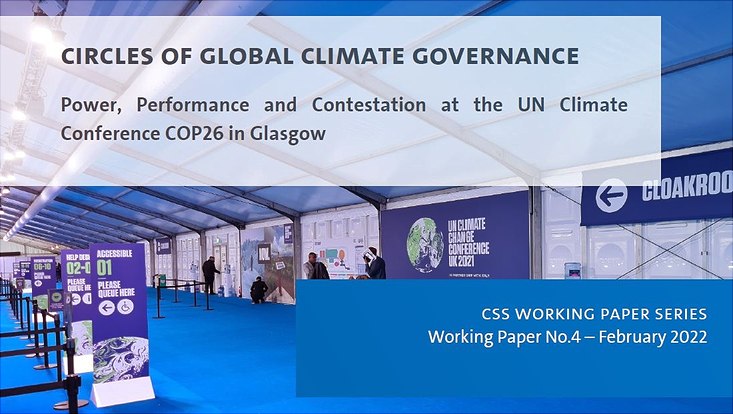Society Research
CSS Working Paper No.4 published: Circles of Global Climate GovernanceStefan C. Aykut, Christopher N. Pavenstädt, Alvine Datchoua-Tirvaudey, Emilie D'Amico, Max Braun, Ella Karnik Hinks, Felix Schenuit, Jan Wilkens and Simone Rödder
14 February 2022, by CSS

Photo: CSS
The fourth Working Paper in the CSS Working Paper Series has been published.
Circles of Global Climate Governance - Power, Performance and Contestation at the UN Climate Conference COP26 in Glasgow
Authors: Stefan C. Aykut, Christopher N. Pavenstädt, Alvine Datchoua-Tirvaudey, Emilie D'Amico, Max Braun, Ella Karnik Hinks, Felix Schenuit, Jan Wilkens and Simone Rödder
Abstract: The working paper examines the UN climate conference (COP26) organised in Glasgow in November 2021 as a transnational mega-event, which constituted not only an important moment in international climate talks, but also a temporary convergence point for a multitude of actors and an arena for conflicts and contestation over framing within a broader global policy space. This perspective allows us to offer a view of the current state of global climate politics more comprehensive than those of analyses focused mainly on the negotiations. Using collaborative event ethnography, over two weeks eight researchers identified the material, spatial and social dimensions of the conference. We identify three circles of climate governance, which framed practices, interactions and debates in Glasgow. These comprise an inner circle of state-led negotiations (‘The In’), an official side programme (‘The Off’) and a relatively heterogeneous wider environment of self-organised events (‘The Fringe’). Each circle is populated by a different set of actors and enacts a distinct representation of ‘the global’. Our analysis of dynamics within each of these circles shows that climate governance has entered a new and contradictory phase, where some boundaries are blurred while others are reaffirmed, and where old conflicts resurface while new dividing lines appear. The Paris architecture for reporting and review has been finalised, but thus far the new approach has failed to close gaps between pledges and objectives for mitigation and climate finance. Global political and corporate elites have seemingly come to acknowledge the climate emergency and the need for a global low-carbon transformation, but the solutions proposed in Glasgow remained partial and fragile, and tightly contained within the dominant horizon of capitalist market- and techno-fixes. The communication strategy of the UNFCCC and the UK Presidency used increasingly radical terms to convey urgency and momentum, which in turn risked emptying activist notions of their content and force. A growing part of the climate movement reacted with critiques of corporate takeover and calls for “real zero” instead of “net zero”. In the conclusion, we examine a series of contentious issues and provide avenues for reflection on the future of climate governance.
| You can download the full text here (pdf) > |


